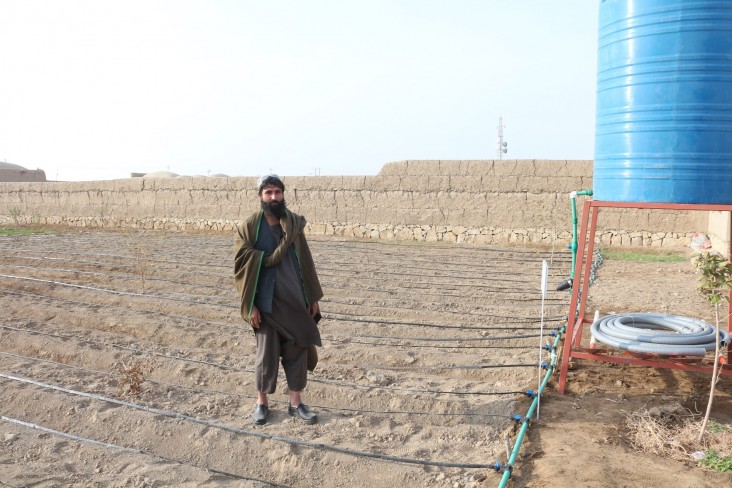Speeches Shim

On a sunny, cloudless day, Mr. Mohammad Naieem reflectively exam-ines a dry plot of agricultural land in Hassanabad village, Jawzjan prov-ince. He reminisces, “The area had enough water. I remember we had three canals full of water flowing throughout our village…”
Today, Naieem says, “…there is no water.” The problem, he explains, is that his area only gets rainfall in winter and spring. “There is no way of capturing and storing water for the summer growing season. It has a huge [negative] impact, not only on our crop production, but on our lives,” he added.
The USAID-funded Strengthening Watershed and Irrigation Management (SWIM) Activity helps farmers such as Naieem maximize scarce irrigation resources. Since the project began in 2016, SWIM has delivered practical on-farm water management training on drip irrigation systems to 7,001 farmers across Baghlan, Balkh, Jawzjan, and Samangan provinces.
Naieem explains how the system works. “With drip irrigation, water is delivered directly to the ground’s surface rather than being sprayed up and out over an area. This direct application of water results in water savings and maximizes crop yield. I learned that the system delivers wa-ter slowly, which helps prevent run-off and over-watering.”
SWIM complements on-farm support with canal rehabilitation to improve the efficiency of irrigation infrastructure and water access for farmers. Farther upstream, SWIM rehabilitates and restores watershed areas, which improves the efficiency of collecting rain water to feed downstream canal systems.
As for Naieem? He plans to sow two small gardens to grow greens, on-ions, and potatoes using a newly installed drip irrigation system. “I trust this system,” he said. “I was cultivating different things using my land in the past, but the crops were drying out [and dying] due to the lack of water. This time I will focus on quality rather than quantity,” he said.
In Jawzjan province, SWIM is rehabilitating Hassanabad, Qanjugha, and Jalalabad canals, each to be completed in 2019. Upper watershed resto-ration and a new round of on-farm water management training will begin in 2019 in Jawzjan province.

Comment
Make a general inquiry or suggest an improvement.